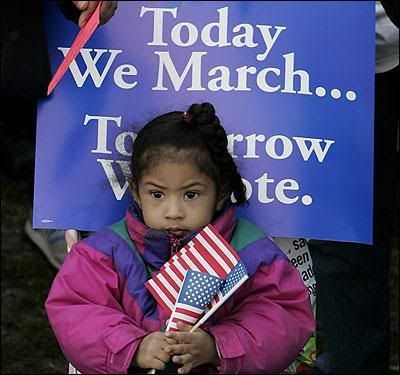 In the spring of 2006 millions took to the streets in cities, large and small, across the nation. Carrying signs proclaiming, "Today We March – Tomorrow We Vote," they voiced their opposition to legislation intended to criminalize 12 million undocumented immigrants, divide families, and foster a climate of fear and intimidation. They demanded instead that meaningful, humane, and responsible, immigration reform be enacted.
In the spring of 2006 millions took to the streets in cities, large and small, across the nation. Carrying signs proclaiming, "Today We March – Tomorrow We Vote," they voiced their opposition to legislation intended to criminalize 12 million undocumented immigrants, divide families, and foster a climate of fear and intimidation. They demanded instead that meaningful, humane, and responsible, immigration reform be enacted.
Two and a half years later, no such legislation has passed, replaced instead by a toxic and divisive debate that has led to increased raids, illegal detentions, hate crimes, and the very climate of fear and intimidation the marchers took to the streets to oppose. These events have galvanized the Latino community like never before and set the stage for what could be a seismic shift in the American electorate.
Recently released data on voter registration points to the dawn of a new political reality.
Unable to pass new restrictive and punitive legislation, the Right resorted to a mix of increased discriminatory local regulation, increased workplace raids, reinterpretation of federal statutes to allow for civil rights violations, and a media campaign to attempt to legitimize their deportation agenda with the general public. And while they have had some success in riling up their base and redirecting their fears and prejudices towards a fabricated "brown menace" and away from failed economic and foreign policy decisions, the issue has proven to be an electoral non-starter. Campaigns that have relied on restrictionist rhetoric have been utterly unsuccessful..
But now it appears that the dogs of hate unleashed by the anti-immigrant crowd are about to turn around and bite their masters. It’s now becoming evident that they woke a sleeping giant and ignited a flame that has fired up the nation's largest minority like never before. This November, Latinos, and other ethnic groups with large immigrant populations, hold the key to victory in not only the obvious swing states, but a few that some might find surprising.
The passion of the immigration debate has galvanized immigrants and motivated them to apply for citizenship in record numbers. As a result, millions of new voters are preparing to cast their first ballots in November. These new citizens are joining long-time U.S. citizens of Latino background who are newly energized to turn out for the first time in years. Combined with the U.S.-born children and grand-children of immigrants who are coming into voting age, this wave has created a formidable force of Latino voters in 2008. Political scientist and Latino voting expert Matt Barreto of the University of Washington predicts turnout of over 9 million Latino voters in 2008, compared with 7.6 million Latino voters in 2004
Link
The protests of 2006 were the largest in US history and elicited different reactions from various groups. Knuckle draggers on right, like Lou Dobbs and Pat Buchanan, saw the marches as the greatest threat to "White European" hegemony in the history of the republic and went ballistic riling up their base to oppose the "brown menace." Progressives and the rest of the liberal chattering classes sat there, jaws agape, wondering how this ragtag group, seemingly without formal organization, or inside-the-beltway guidance, managed to put millions in the streets while they had had such limited success in mobilizing their own forces for similar efforts in opposition to the war.
Latino, immigrant advocacy, and civil/human rights organizers saw something different. They saw the birth of a movement. A movement Washington insiders played little, if any, roll in organizing – a true grassroots effort, born of the streets. Organizers across the spectrum, from well established DC advocacy groups to local community organizations to grassroots groups that sprung up in the wake of the marches, all saw the potential of this new movement and quickly started to mobilize.....particularly in the areas of naturalization of new immigrants and voter registration. And they are now about to reap the rewards of those efforts.
In 2008 alone, over 900,000 new naturalization petitions were approved. Of those, the vast majority plan on voting.
The We Are America Alliance (WAAA) expects significant Latino turnout for Election Day 2008. ...(and) is in the process of registering 500,000 new citizen voters and mobilizing one million to cast ballots on Election Day. WAAA is focusing its efforts on thirteen states with a high number of immigrant and Latino citizens, aided by last year’s surge in naturalization applications. Link
WAAA's numbers are impressive:
- Over 83,000 new voters in Florida
- 70,000 in California
- 35,000 in Pennsylvania
- 25,000 in Texas
- 25,000 Illinois
- 18,000 in Arizona
- 17,000 in New York
- 35,000 in Colorado
- 52,000 In Nevada (almost 2.5 times the amount that state was decided by in the 2004 presidential election - George W. Bush won Nevada by 21,500 votes).
- 40,000 in New Mexico (George W. Bush won by 6,000 votes in 20040
And these numbers reflect the efforts of only one group focusing mostly on new immigrants. Others, such as Voto Latino are concentrating on the broader Latino community and Latino youth vote. And then there are the efforts of the various campaigns and political parties to register Latino voters.
Yesterday, Democracia USA, one member of the We Are America Alliance, announced the final tallies of it's registration efforts in 7 States.
Democracia U.S.A. (D-USA), a national non-partisan Hispanic voter registration and civic engagement organization, today released its final Hispanic voter registration figures for 2008, which enumerate the organization’s efforts over the past year and shows an average 7.6% increase in voter registration in the seven states where it operates, totaling a one percent increase in the entire Hispanic electorate. D-USA operations in Arizona, Florida, Nevada, New Jersey and Pennsylvania reported the following increases in registrations:
Arizona 2%
Florida 6%
Nevada 11%
New Jersey 6%
Pennsylvania 10%
These increases demonstrate an overall trend across the country of emerging political activism and interest among Hispanics as their numbers increase state-by-state.
In Florida, the Hispanic voting population in the Orlando media market quadrupled between 1990 - 2008 from 66,000 to 234,000 and Central Florida Hispanics show an acute tendency to vote for the candidate not the party, making it the most swing prone voting bloc in the nation. The percentage of Miami Dade’s overall Hispanic electorate grew from 44% in 2000 to 50% in 2008, while the percentage of native-born Cubans within this group fell from 75% in 2000 to 58% in 2008.
In Pennsylvania, a D-USA Hispanic voter trend study noted an increase of 84,000 Hispanics registering to vote between 2006 and 2008 with a statewide Hispanic electorate total of 294,000. Democracia USA’s three regional offices in Philadelphia, Reading and Pennsauken, NJ. registered over 50,000 new voters in Pennsylvania and Southern New Jersey in that same timeframe.
Finally, since 2000, Hispanic voters in Nevada have more than doubled, now making them 11% of the state’s total electorate.
Link
According to Jorge Mursuli, President and CEO of Democracia U.S.A., new registrants in Florida have been trending decidedly Democratic. In 2004, 47% of registrants listed themselves as Independents, with the remainder splitting relatively evenly between Democrats and Republicans. In 2008, 58% of new registrants are registering as Democrats, with Republicans garnering numbers in the low 20% range.
We won't know the full effects of all these efforts until after the election, but it's become quite obvious to most following these trends that the Republican Right and their media lapdogs have overplayed their hand, underestimating the blowback their anti-immigrant/anti-Latino rhetoric would cause.
A recent poll from NDN, conducted by Bendixen & Associates, asked Latinos, “How important is the immigration issue to you and your family?” In Florida, 79% of Latinos viewed immigration as important (51% “very important”); in Colorado, 74% viewed immigration as important (42% “very important”); in New Mexico, 80% viewed immigration as important (43% “very important”); and in Nevada, 86% viewed the issue as important (58% “very important”).
... In 2004, George W. Bush won approximately 40% of the Latino vote nationwide, but polls today show weaker support for the Republican Party among this demographic. The Pew Hispanic Center recently found that Latinos favor Senator Obama over Senator McCain 66% to 23%.x In their research, 76% of Latino registered voters rated Senator Obama favorably, in comparison to a 44% favorability rating for Senator McCain.i Obama leads among Latinos in the Gallup daily tracking poll by an average of 59% to 30% over the past month. And a Wall Street Journal poll shows Latino voters favoring Obama over McCain 63% to 30%, while the poll shows the candidates tied with the general electorate.
These numbers are repeated in the hotly-contested “battleground” states. In Colorado, Senator Obama leads McCain among Latinos 56% to 26%; in Nevada, 62% to 20%; and in New Mexico, 56% to 23% according to the NDN poll. In Florida, a state where George W. Bush won a majority of Latino support in 2004, Latino voters’ preference is now evenly divided between the two candidates. And a new NALEO Educational Fund survey shows Latino voters who have made up their minds favoring Obama 63% to 15% in Colorado; 55% to 14% in Nevada; and 61% to 20% in New Mexico, with the candidates in a near statistical tie in Florida. Link
Obama's strong showing among Latino voters follows a general trend where Democrats are viewed as more concerned about issues that effect Latinos ... and particularly the hot button topic of immigration.
When asked “which party has done a better job on immigration” by NDN/Bendixen, Latino voters favored generic Democrats by the following margins: in Florida, 48% to 29%; Colorado, 48% to 14%; New Mexico, 46% to 19%; and Nevada, 58% to 20%.
The NALEO Educational Fund poll finds that nearly two-thirds of Latino voters in Colorado, New Mexico, and Nevada believe the Democratic Party has the most concern for the Latino community, while only 6%, 4%, and 7% respectively chose the Republican Party. In Florida, 40% of Latino voters say the Democratic Party has more concern for the Latino community, while 20% choose the Republican Party and one-third say there is no difference. And a Pew Hispanic Center survey found that 49% of Latinos “say that the Democratic Party has more concern for Hispanics, while just 7% say the Republican Party has more concern. Since 2004, the share of Hispanics who say that the Democratic Party has more concern for Hispanics has increased by 14 percentage points.”
Link
For many Latinos, their concern about immigration has just as much to do with the tone of the debate as policy specifics. Polling shows that Latinos favor a comprehensive approach immigration reform at about the same rates as the general population. But as Cecilia Muñoz, Senior Vice President at the National Council of La Raza recently said, immigration “tends to determine who the good guys are and the bad guys are for Latinos.”
This is perhaps most evident in one of the most conservative groups within the Latino community; Evangelicals ... a group that according to the Pew Hispanic Center accounted almost entirely for Bush's increased share of the overall Latino vote in 2004, which grew from 35% in 2000 to 40% in 2004.
Evangelicals are one of the fastest growing segments of the Latino community. In 2004, they represented about one-third of the Hispanic electorate (up from one-quarter in 2000), and 63 percent voted for Bush—the first time on record that a Republican presidential candidate won the Latino evangelical vote.
Latino evangelicals are a distinctive demographic. They tend to be more affluent, more educated and more acculturated than other Hispanics. They're also more likely to be citizens and more likely to vote. "They punch above their weight when it comes to electoral impact," says Luis Lugo of the Pew Forum on Religion and Public Life. Politically, they tend to be highly conservative on social issues like abortion and gay marriage—in fact, more conservative than white evangelicals, according to various studies—but liberal on economic matters, such as publicly funded health care
... This year, the trend lines are disconcerting for Republicans. Bush was an appealing figure to Hispanic evangelicals—full of religious ardor, devoted to a conservative "life" agenda and appreciative of Latino culture. Yet many of them have soured on him as a result of the economic crisis and the war in Iraq. Moreover, GOP stridency on illegal immigration has made the party appear anti-Hispanic. The platform Republicans adopted at their convention didn't help. It called for declaring "English as the official language in our nation," and with regard to immigration, it emphasized border security and rejected "en masse legalizations." (Rev. Samuel) Rodriguez uses adjectives like "xenophobic," "nativist" and "anti-immigrant" to describe it. McCain has struggled in this environment. Though he championed immigration reform for years, he dialed back his support during the primaries.
Link
Today, a coalition of leading Latino Evangelical organizations released a report looking at polling trends among Latino Protestants, 80 percent of whom self-identify as born-again and/or attended an Evangelical denomination.
"The Biblical mandate to welcome the immigrant could not be clearer and we draw our values from our Bibles," said Rev. Samuel Rodriguez, President of the National Hispanic Christian Leadership Conference, who spoke during the press conference announcing the survey results. "This poll powerfully demonstrates that immigration is a profoundly religious issue for Hispanic evangelicals. We will vote our faith and we will vote our values. It's time that all candidates take notice."
"Latino Protestant voters are demonstrating a faith-based politics that puts moral solutions above ideology and sound bites," added Katie Paris, Director of Communications Strategy at Faith in Public Life, a sponsor of the poll. "Consequently, they are commanding the attention of both parties and defying the outdated stereotype that people of faith are mired in partisanship," she concluded.
- Latino Protestant registered voters favor Democrat Barack Obama over Republican John McCain by a 17-point margin (50.4 percent to 33.6 percent with 10.4 percent still undecided). This margin of support for Obama is slightly lower than his lead among the Latino population overall.
This is a dramatic shift from 2004 when George W. Bush soundly won the Latino Protestant vote. According
to 2004 post-election survey data, Bush won 63 percent of these voters, up from 32 percent in 2000
- 76.8 percent say their religious beliefs are important in influencing their views on immigration (54.6 percent say very important). Only 19 percent say their religious beliefs are not important in influencing their views on the issue.
Like all other voters, Latinos are most concerned about the economy, healthcare, education and Iraq. But the underlying specter of the xenophobia and racism that marked the immigration debate has led them to more readily question if they have any future in the Republican party.
Back in 2005, when there was still talk of "the permanent Republican majority" and Jim Sensenbrenner and his colleagues in the House Immigration Reform Caucus were pushing through Tom Tancredo's deportation bill, HR4437, one must wonder if they had any idea what waking the sleeping giant would really mean to their party's future.
More info on the Latino vote, and registration efforts in various swing states:
FL
NM
CO
PA
FL
CO
Read More...
Summary only...
 While the rest of the nation will spend much of election night glued to their TV screens or computer monitors awaiting results from key battleground states, William Gheen and his octogenarian army at the anti-immigrant hate group, ALIPAC, will be monitoring police-band radios and setting up an on-line "command post" in anticipation of the "unrest and mayhem" that he believes will result on election day.
While the rest of the nation will spend much of election night glued to their TV screens or computer monitors awaiting results from key battleground states, William Gheen and his octogenarian army at the anti-immigrant hate group, ALIPAC, will be monitoring police-band radios and setting up an on-line "command post" in anticipation of the "unrest and mayhem" that he believes will result on election day. 















 In the spring of 2006 millions took to the streets in cities, large and small, across the nation. Carrying signs proclaiming, "Today We March – Tomorrow We Vote," they voiced their opposition to legislation intended to criminalize 12 million undocumented immigrants, divide families, and foster a climate of fear and intimidation. They demanded instead that meaningful, humane, and responsible, immigration reform be enacted.
In the spring of 2006 millions took to the streets in cities, large and small, across the nation. Carrying signs proclaiming, "Today We March – Tomorrow We Vote," they voiced their opposition to legislation intended to criminalize 12 million undocumented immigrants, divide families, and foster a climate of fear and intimidation. They demanded instead that meaningful, humane, and responsible, immigration reform be enacted. With all eyes turned to Denver and the historic events unfolding there, Republicans met to hammer out the details of John McCain's platform to be unveiled this coming week. One crucial question regarding just how much McCain would waver on some of his previously held positions in order to mollify the right-wing was answered with the release of the first draft of the immigration plank.
With all eyes turned to Denver and the historic events unfolding there, Republicans met to hammer out the details of John McCain's platform to be unveiled this coming week. One crucial question regarding just how much McCain would waver on some of his previously held positions in order to mollify the right-wing was answered with the release of the first draft of the immigration plank.
















